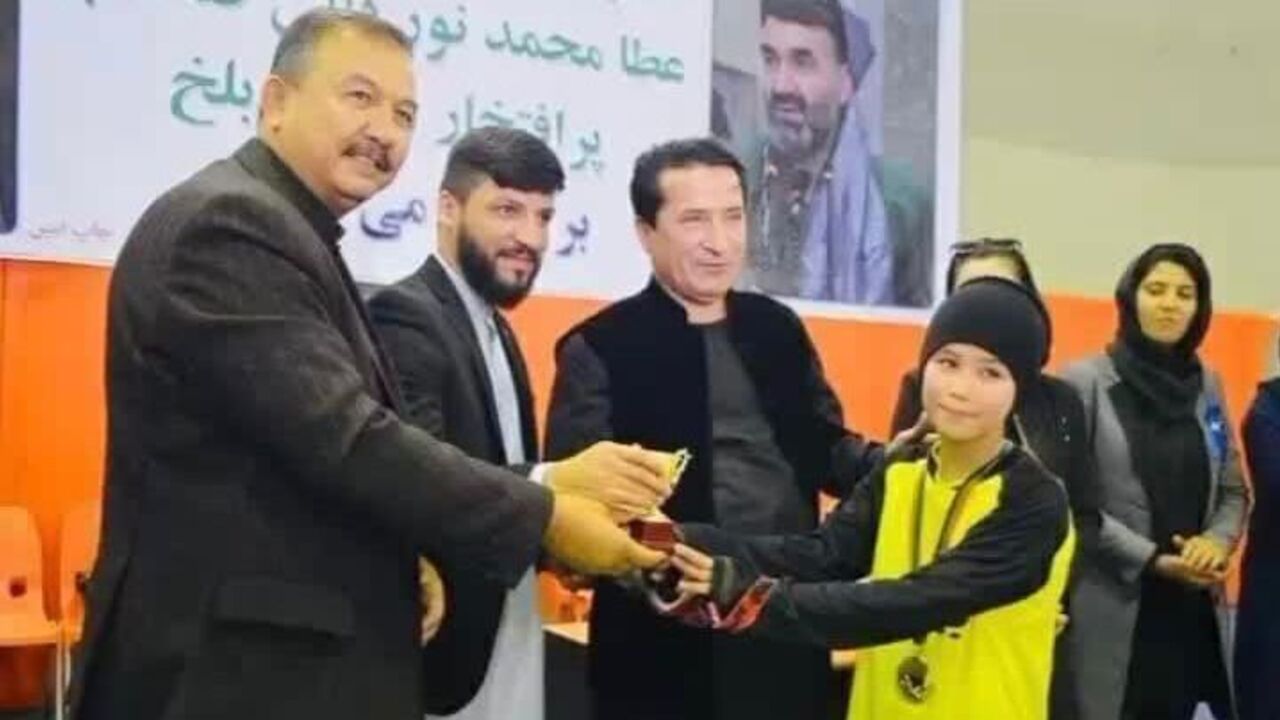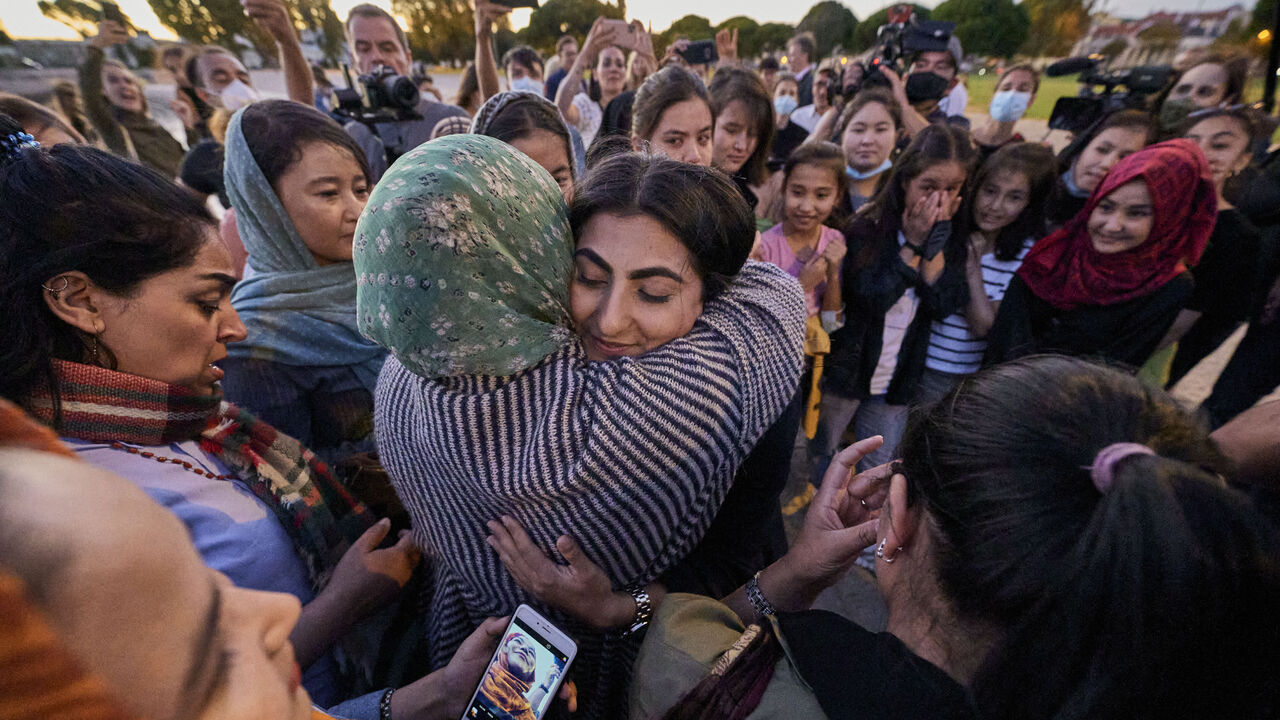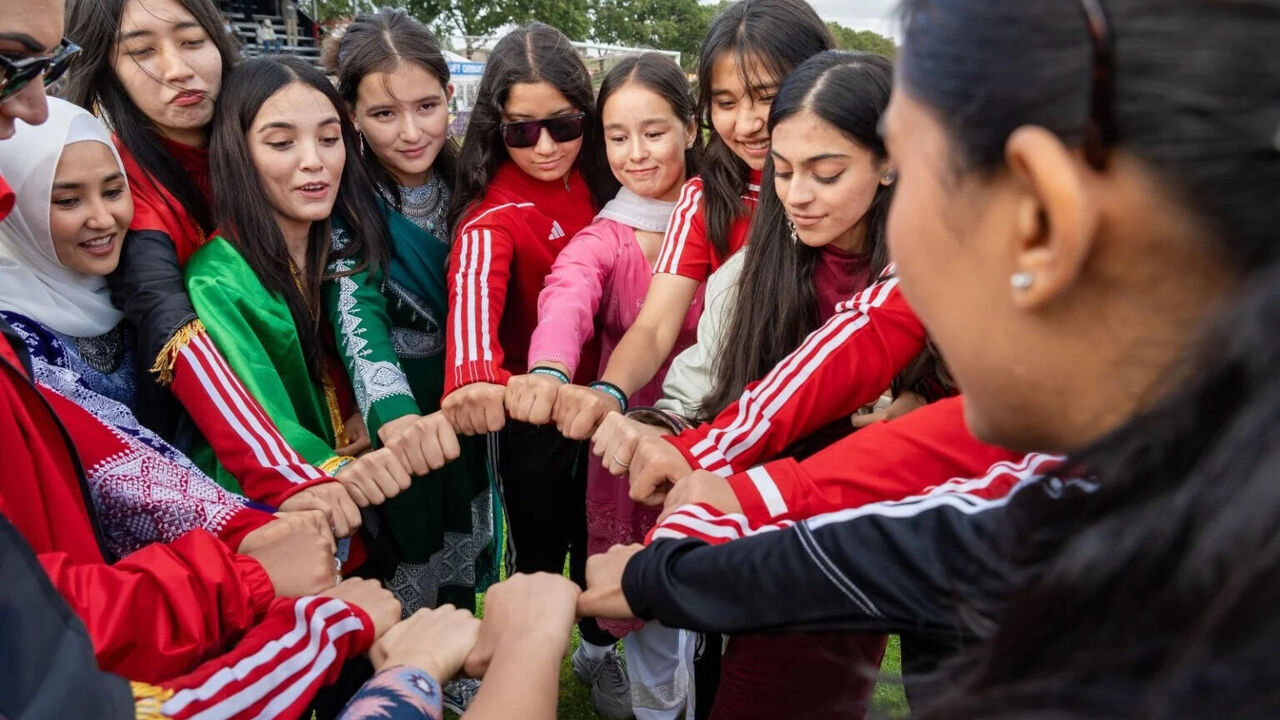Meet the women's soccer trailblazer who helped hundreds flee the Taliban
During Women's History Month in March, theScore is publishing stories that illustrate how women in sports lead, inspire change, and navigate their careers.
Frishta Qasemi didn't know Farkhunda Muhtaj, but she put her life in her hands.
"I was scared for my life. If the Taliban knows that I'm a soccer player, they're going to kill me, of course. I think that Farkhunda was the only choice," said Qasemi, who was just 15 when the democratically elected Islamic Republic of Afghanistan fell in August 2021. "I had to trust her."
Muhtaj - born to Afghan refugees in Pakistan before the family moved to Canada when she was 2 - proudly captained the Afghanistan women's national team before the Taliban took over. In April, she'll be among the trailblazers who kick off the inaugural season of Canada's first professional women's soccer league, the Northern Super League (NSL), when she suits up for Calgary Wild FC. Muhtaj was the club's first official signing last year.
Her work to help Afghan youth team members flee their homeland means her NSL journey will be followed by many much further afield than Calgary. The Afghanistan Football Federation asked Muhtaj, along with other Afghan players based around the globe, to coordinate the evacuation missions from Kabul four years ago. The dedication and dependability of Muhtaj, who was then a 23-year-old playing semi-professionally in Ontario, was undeniable, but her relative inexperience in such matters indicated how desperate the situation had become.
"I had no clue what to do, if I'm being honest," she told theScore.
"There's no commercial flights leaving the country, all borders are closed, there's Taliban checkpoints throughout the country, and the political landscape kept shifting as well," she explained of the hurdles that threatened to derail the evacuation efforts.

It took time for Muhtaj to find the support she needed. Certain organizations and humanitarian lawyers she felt would be well connected didn't provide the response she hoped for. It wasn't until she formed a team featuring government officials from the United States that her drive gathered momentum.
As the leader of her national team, Muhtaj would be a hero to thousands, or more likely millions, of girls in most parts of the globe. Afghanistan was different. "Many of them didn't even know who the hell I was," she said, detailing the lack of exposure given to the team while so many considered soccer unsuitable for women - even when Afghanistan wasn't under the Taliban's glare. Muhtaj also didn't have any social media presence until 2021.
But Qasemi and the other youth players had no choice. A stranger was their only possible path to freedom. Qasemi made the emotional decision to travel alone, without her mother or any of her four younger siblings - the eldest aged 10 and the youngest just six months - because they could bring no more than three family members with them. Despite this distress, she and her teammates keenly followed Muhtaj's updates over WhatsApp; they observed instructions to move around the country's capital and venture into remote locations for various escape plans.
"These girls were heavily at risk. Anything could have happened to them. I was really fearful," Muhtaj said. "And you know what? We failed miserably dozens and dozens of times within each plan that we had."
Qasemi remembers one failed plan two days before the Taliban's deadline of Aug. 30, 2021 for evacuees to leave the country. Muhtaj supplied the coordinate points to an unmapped gate at the back of the airport, but the girls found on their journey that the Taliban had recently opened a checkpoint on the only route to get there. Some girls, along with Qasemi, and their family members left their cars and still tried to reach the gate on foot through challenging terrain. They walked through the night and needed to wait until the darkness receded to see their target.

"I was walking five, maybe six or seven, hours on the mountains to find a way to the door," Qasemi told theScore. Except, when they eventually saw the gate, it was now blocked by the Taliban. They were firing their guns into the air to deter people from moving closer.
Qasemi started to doubt Muhtaj.
"I was so mad. I was crying so bad. I was like, 'Maybe she's just playing with us,'" Qasemi recalled.
Questions kept rolling around in her head: "Why am I doing this? Am I leaving the country or not? Is Farkhunda helping me or not?"
Losing trust
Muhtaj had the difficult task of keeping everyone on board with the ever-shifting operation to get them out of Afghanistan, while also ensuring their safety and maintaining their trust. In many instances, hope burned out - and it didn't help that the militant rulers' deadline for evacuees to leave had expired.
Belief was dwindling. Over 220 people were part of the original group Muhtaj was working to help evacuate. By the time she asked them to board buses for an eight-to-10 hour journey north from Kabul to Mazar-i-Sharif, more than half had decided to stay behind.
Muhtaj attributes the loss of faith to malicious rumors that she was selling their passports and visas, deliberately feeding incorrect information, and planning to profit from the vulnerability of the girls and their desperate families.
"We never took a dime, ever," Muhtaj said. "We actually supported them financially as well, because all banks were closed, and so we tried through the partners that were on the ground (to give) them cash support to buy basic needs."
The party of over 80 that remained stayed in safe houses in Mazar-i-Sharif for 20 days. The delay was longer than expected as Muhtaj dealt with another rush of issues, including more airport chaos and bordering countries unwilling to let the group in without asylum.
They could only wait. Going outside risked attracting the attention of many Taliban stalking the streets.
"It was really hard for everyone to be in the same room with more than 20 or 30 people," Qasemi, who was born and raised in Mazar-i-Sharif, said. "It was really tough. Everybody was very bored and tired."
A breakthrough occurred when Muhtaj and her team managed to secure the group a place on a chartered flight out of Afghanistan, a rarity after the Taliban regained control of the country. It was 22 days after the deadline to evacuate. Buses were quickly sent to the safe houses for transport to the airport to capitalize on the small window of opportunity. Concerns over documentation and other security-related problems at the airport evaporated as the plane took off for the Portuguese capital of Lisbon via Tbilisi, Georgia.

There were mixed emotions as the girls left their homeland. From the bus window, Qasemi had soaked in the views of Mazar-i-Sharif; most of all her eyes studied the streets where she refused to surrender to oppressive cultural expectations, soldiering on through bruises and abuse to hone her soccer skills with local boys. Her defiance, and her talent as a skillful winger, ultimately led her to safety. She was still only 15 and without her family. But she was safe.
The eventual success of Muhtaj's first evacuation attempt led to another mission in November. During the second wave, 225 people landed in Portugal. Overall, Muhtaj has helped over 300 escape Afghanistan.
'She's like a mother for us'
Muhtaj's humanitarian efforts aren't restricted to moving people from Afghanistan. She's the co-founder of the Scarborough Simbas, based in the east Toronto district where she grew up, which was an idea spawned from when she saw "how disproportionately affected the newcomer and refugee community was" during COVID-19. Coaching soccer to children from refugee families is at the organization's core, but it crucially acts as a support hub for local immigrants, too. Meals and gatherings are held at the Simbas' base. Grocery store vouchers are sometimes available to further combat food insecurity.
Muhtaj's relationship with the footballers she saved also remains strong. Qasemi cherishes the times she plays with Ayenda FC, an Afghan youth national team. The squad is named after the word for "future" in Farsi and serves as an unofficial replacement for international soccer since playing sports is among the many basic human rights that the Taliban denies women. Qasemi and other girls who fled the deeply oppressive regime have competed at prestigious youth tournaments including Sweden's Gothia Cup and Denmark's Dana Cup, with Muhtaj on coaching duties.
"All of the girls on your team were the friends (from when) you were in the bad days. We know what we have been through," Qasemi said of the team spirit. "It's very special for me."

Qasemi's ties to her homeland were strengthened further when, after three testing months alone in Portugal, her mother and four siblings joined her on the Iberian peninsula. She's now on a scholarship in Wisconsin, but she travels back to Portugal to spend time with her family during breaks in her studies.
Muhtaj's influence promises to endure in Qasemi's life. The Calgary Wild attacking midfielder and the young Afghan footballers don't get to see each other face-to-face regularly, but they keep in touch over WhatsApp and via video calls every two or three weeks.
"She's like a mother for us," Qasemi, now 19, said. "She always inspires us and motivates us to continue and to achieve the goals that we have."
The evacuations from Afghanistan and continued projects with the Simbas and Ayenda have highlighted to Muhtaj how much of an impact she can make as a professional player.
"I feel like now as a footballer, I feel a greater sense of responsibility, and I know the power of what we can achieve on and off the pitch," Muhtaj shared.
And, like Muhtaj, perhaps it's off the pitch where some of the girls will make the most meaningful impact.
"I always like to help people, especially refugees," Qasemi said.
HEADLINES
- LAFC coach Cherundolo to end successful tenure after 2025 season
- Crew braced for record crowd when Messi visits Cleveland's Dawg Pound
- Former Jazz owners buy Real Salt Lake, Utah Royals
- Latest transfer news and rumors: Barcelona done with Nico Williams
- Shaqiri shines again at title-chasing Basel after MLS misery